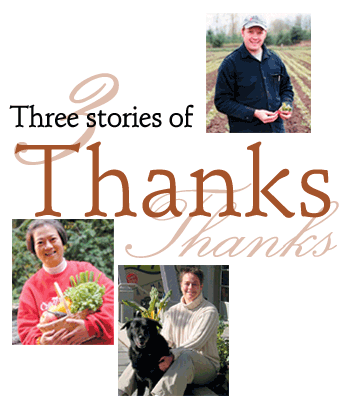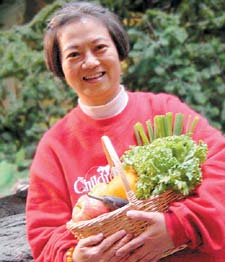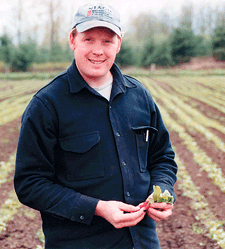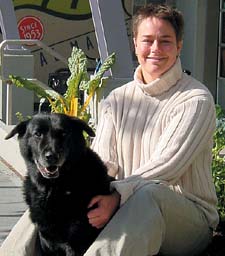Three stories of thanks
by Brian Schaeperkoetter
This article was originally published in November 2003

(November 2003) — As we celebrate the season of giving, it’s a good idea to take pause and recognize things we are thankful for. This month we share three stories of thanks from a member, a farmer and a partner.
In the breakroom at Seattle Center’s Children’s Museum, Li Huan Moretz is laughing with co-workers and enjoying her lunch. “Fresh crop,” she says as she plucks a baby carrot from a bowl of mixed vegetables and pops it into her mouth. The 47-year-old mother of one works as an assistant at the museum and has been a PCC member since 1981, the year she moved from Taiwan to Seattle.
Her relationship with PCC started simply — like many other shoppers and members throughout the Seattle area — with a love of fresh food.
“We were the only family I knew in Taiwan who ate brown rice,” she said. “My family ate very healthy. Growing up, I never had canned food. My mother would go to the market every day to shop for fresh vegetables.”
So, when Li Hua and her extended family of 10 moved from Taiwan to Seattle’s University District more than 20 years ago, she found that the naturally grown, market-fresh produce she had come to rely on was in short supply in Seattle. She found comfort in weekly U-District farmers’ markets. But she still craved the bulk grains and fresh selection she had grown accustomed to in Taiwan. On a friend’s tip, she took a trip to PCC’s nearby Ravenna store. Since then, she has been an active PCC shopper — and member.

“Back then, with such a large family, we bought lots of potatoes,” she laughed. But there were other reasons to be thankful for finding a store like PCC. “After moving to Seattle, my 81-year-old mother-in-law was diagnosed with breast cancer. Because of PCC, I could prepare the type of diet she needed.” And, with the help of PCC’s staff, Li Hua was also able to locate and order the naturopathic healing medicine her mother-in-law needed to cope with her illness.
“We are so lucky to have this kind of store here,” she said.
Over the years, Li Hua, now a regular View Ridge shopper, has shared her love of natural foods with her friends as well as her family. When she met an older woman in a healing class who wanted to explore new horizons, Li Hua introduced her to natural foods. “It’s hard for people to change their diets and eat healthier foods,” she said. “But I tell my friends ‘you have to go to PCC!’ I love to show them around and see them learn new things.”
And, when a friend moved to the Fremont area several years ago, Li Hua made it a top priority to introduce her to the neighborhood PCC. Years later, that same friend would return the favor by helping help Li Hua compose a letter to PCC. Her simple request? Stock the organically grown salad greens she would find at weekly U-district farmers’ markets.
Her letter-writing effort paid off. In 1997, PCC began a partnership with Full Circle Farm, operated by Andrew Stout — a transplanted Midwesterner with a love of the outdoors and a commitment to organic farming. The salad greens Li Hua came to love at her local farmers’ market are now available for daily purchase at PCC.

Located in the Snoqualmie Valley near Carnation, Washington, Full Circle Farm is a 140-acre certified organic produce farm, cultivating more than 75 varieties of fruits, vegetables and herbs. Since 1997, the farm has supplied PCC with everything from kale and chard, to zucchini and winter squash — not to mention the variety of 15 baby greens that make up their popular salad mix.
“What are we thankful for?” asks Stout. “We’re very thankful for another 60 acres!” For years, Stout had been eyeing the nearby parcel of land with anticipation — dreaming of the additional crops he could grow. “We closed on the property in August. Having this new farmland just over the fence will have a tremendous impact on the variety of things we grow.”
Stout’s connection to the land is firmly rooted in his family. His grandmother was a naturalist and his grandfather was a master gardener. Eight years ago, Stout was working as a landscaper in Central Oregon when he decided he needed a change. “I really wanted to keep doing something where I worked outdoors. And I wanted to be my own boss,” he said. With his background in cultivation and love of land, farming seemed to fit the bill.
A farming internship in Minnesota confirmed what Stout suspected: he was born to farm. In 1995, Stout and wife Wendy Munroe began laying out plans for three modest, leased acres.
Things have changed a lot since then. Full Circle Farm has grown into a thriving enterprise, providing produce to grocery stores, top Seattle restaurants and numerous farmers’ markets. Each week, the farm also delivers boxes of produce to 100 Community Supported Agriculture members throughout Puget Sound. This past October, Full Circle Farms hosted its second annual harvest festival. More than 250 friends, family members and business partners showed up to celebrate, filling his small parking lot to capacity.
“I was blown away,” said Stout. “We had a hundred people walking through the crops, learning about the farm. We showed kids how carrots grew — just pulled them out of the ground and watched their eyes get as big as saucers. It was like, wow. This isn’t all just hard work. We’re making an impact here. Community support like that is a tangible way of recharging the batteries. It makes us realize we’re doing things the right way” he said.
“We started with three acres. Now we have 140 acres total. And 120 of those are tillable. I am thankful for the opportunity to have a successful farm — to be able to provide a tremendous amount of food for folks in Seattle.”
Stout’s mission of turning country crops into city meals is especially relevant to Lee Harper. As the program coordinator for the Fremont Public Association’s Lettuce Link program, Harper works to turn neighborhood gardens and P-Patches into growing fields to fight hunger.

Harper is also a PCC member and is keenly aware of the impact farming can have on our community. “As urban farmers,” she said, “we have the chance to use Seattle’s gardens and lands to grow and harvest organic produce for hungry families.”
Since its inception in 1990, local gardeners who participate in the Lettuce Link program have has generated more than 200,000 pounds of organically grown fruit and vegetables, which are distributed to thousands of needy families. Lettuce Link has become the primary source of organic produce throughout Seattle’s food bank system.
“PCC and Lettuce Link’s missions are closely aligned,” said Harper. “We both work to form local connections and community partnerships.” In June, PCC partnered with Lettuce Link for the grand opening of the new Fremont store, raising more than $2,800 to benefit the Lettuce Link program. That collaboration also sprouted another partnership — the creation of a Lettuce Link-sponsored organic garden in front of PCC’s Fremont store.
The garden demonstrates how small urban spaces can be used to grow organic produce that can be used to fight hunger.
“During the Fremont opening, I was sitting near the empty planter boxes with some PCC folks and said, hey … we should do a demo garden right here. It was that simple — a natural link and easy connection.”
In addition to her connection to PCC through Lettuce Link, Harper is grateful for the other ways PCC works to support her local community.
“I joined PCC as a member in 1994,” said Lee Harper. “At the time, I lived in a group house and shopped at the old Greenlake store — which I loved because it seemed so tiny and crunchy. I had been in Seattle for a year and wanted to participate in a co-op. PCC was a natural choice. Good fresh fruit and a neighborhood store that supported local events.”
“At the time,” she continued, “I felt it was very important to shop in my neighborhood. There was a Safeway nearby, but I’m such a local girl, it was much more gratifying to shop at PCC.” Harper, who lives in Wallingford now, stops by the Fremont store at least twice a week — for fresh produce and to tend to the store’s Lettuce Link garden.
“Joining the Fremont Public Association and Lettuce Link really opened my eyes to the amount of community involvement PCC has,” she said. “I am especially thankful and amazed at the work the Farmland Fund does. It’s a major reason why I continue to support PCC through my membership.”
“Bottom line? Sure, PCC has good food and nice sandwiches,” she said. “But it’s the things the co-op does for our community — like supporting organic farmland — that are especially important.”
